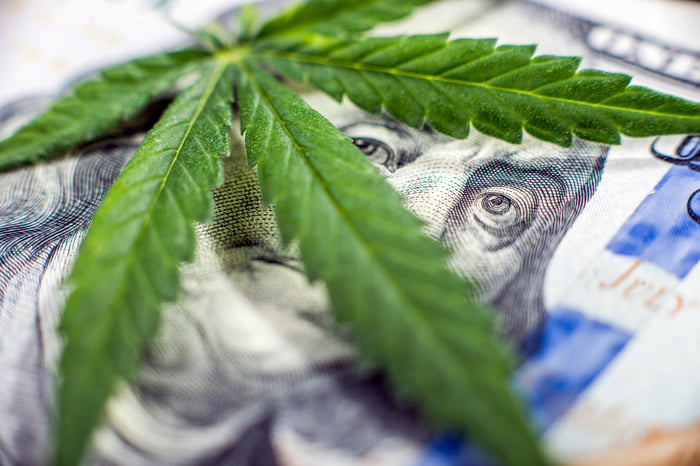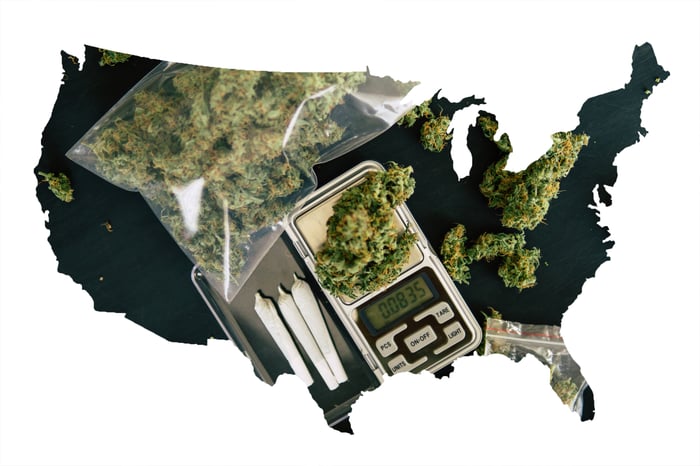America witnessed history being made earlier this week. On Tuesday, August 11, the presumptive Democratic Party nominee for president Joe Biden announced via tweet that his 2020 running mate would be Democratic Sen. Kamala Harris of California. This marks just the third time a woman has appeared as a vice presidential candidate on a major party ticket and the first time in history a Black woman (and also one of Asian-American descent) has appeared on a major party ballot.
With Joe Biden consistently leading in the polls in recent weeks, the addition of Harris to his campaign will bring her policy proposals into focus now more than ever. One, in particular, has the cannabis world abuzz.

Sen. Kamala Harris at a healthcare rally. Image source: Kamala Harris' Senate Web page.
Kamala Harris' stance on cannabis has evolved considerably over the past decade
Prior to dropping out of the presidential race in December 2019, Sen. Harris had made it very clear that she supports the federal legalization of marijuana.
Kamala Harris wasn't always a supporter of the green rush. When she was elected as California's attorney general back in 2010, she opposed a then-statewide ballot initiative to greenlight recreational cannabis. At the time, Harris would only support medical marijuana. But her views on marijuana have changed drastically over the past decade -- as have the American public's, for that matter.
In 2015, Harris called for the end of a federal ban on marijuana and suggested that it should be decriminalized. A year later, following her election, Harris noted that, "While I don't believe in legalizing all drugs, as a career prosecutor I just don't, we need to do the smart thing, the right thing, and finally decriminalize marijuana."

Image source: Getty Images.
In 2018, she took the next step by backing legislation that advocated for the legalization of marijuana at the federal level. Harris was particularly critical of President Trump's original Attorney General, Jeff Sessions, who frequently attempted to go after medical-marijuana businesses in legal states, and he rolled back protections on cannabis providers in legalized states.
Most recently, Kamala Harris was a co-sponsor of the Marijuana Opportunity, Reinvestment and Expungement (MORE) Act, along with Sen. Jerry Nadler (D-N.Y.). The MORE Act was the first comprehensive marijuana-reform legislation ever voted on in Congress -- and it passed by a vote of 24-10 in the House Judiciary Committee.
Though the MORE Act never became law, it offered a complete overhaul of federal marijuana law by potentially expunging previous cannabis convictions, removing weed from the Controlled Substances Act, and establishing a 5% federal tax on cannabis and cannabis products that would go toward helping persons disproportionately affected by the war on drugs.

Joe Biden listening to former President Barack Obama. Image source: Official White House Photo by Pete Souza.
Legalization is still probably not in the cards
The big question that needs to be asked is this: Does Kamala Harris' presence as Joe Biden's running mate signal an increased likelihood of legalizing cannabis at the federal level if the Biden-Harris ticket wins in November?
On one hand, Harris' presence won't hurt the U.S. marijuana industry's outlook. As a champion of social issues and cannabis reform, Harris, as Vice President, would more than likely comfort U.S. multistate operators and perhaps increase the likelihood that cannabis banking-reform legislation is eventually signed into law.
On the other hand, having Harris on the ticket doesn't guarantee the sweeping reform that cannabis advocates are looking for.
For one thing, Joe Biden has a checkered history when it comes to cannabis. Biden was behind a number of bills in the late 1980s and early 1990s that really came down harsh on drug users and dealers (and this included marijuana users and dealers). Even though Biden's stance on cannabis has softened considerably over the past three decades, he's stated that he's not willing to consider anything more than decriminalization at the federal level, at this point.

Image source: Getty Images.
The other big concern has to do with money.
With the Harris co-sponsored MORE Act, a 5% federal tax was to be levied on marijuana sales. However, the overtaxation of legal channels is already one of the biggest deterrents for consumers looking to buy cannabis products. Tacking on an additional 5% tax would further slow the transition of illicit sales to legal channels and support an already massive black market.
What's more, the federal government is raking in the dough by keeping marijuana a federally illicit substance because businesses selling pot products are hit with Section 280E of the U.S. tax code. This tax section disallows businesses that sell a federally illicit substance from taking normal income-tax deductions, save for cost of goods sold.
In other words, the current setup of state-level legalization with exorbitant high effective tax rates is working marvelously for the federal government. Changing this system could cost the federal government money at a time when deficits are ballooning.

Image source: Getty Images.
U.S. multistate operators are in good shape no matter what happens
The good news for investors and U.S. multistate operators (MSO) is that they can thrive no matter what happens. Ideally, it would be less burdensome if marijuana were legalized at the federal level. This would allow for the interstate transport of pot and pot products, and MSOs wouldn't have to set up potentially redundant cultivation and processing sites in every state where they have retail operations.
However, with these marijuana stocks growing so quickly and nearing recurring profitability, federal legalization would simply be a cherry atop an already very large sundae.
On a national scale, Green Thumb Industries (GTBIF 3.56%) has impressed, with the company reporting 168% year-over-year sales growth earlier this week. Green Thumb has opened 48 dispensaries in nine legalized states but has the opportunity to double its retail footprint to 96 stores in 12 states. Further, same-store sales from the 16 locations open at this time last year soared 75% in the second quarter. Green Thumb is firing on all cylinders and nearing recurring profitability.

Image source: Getty Images.
Focused MSOs have been stellar, too. Trulieve Cannabis (TCNNF 3.83%), which has 55 of its 57 open dispensaries located in Florida, blew operating expectations out of the water this week. Trulieve's second quarter featured record sales of almost $121 million (a sequential quarterly increase of 26%), free cash flow of nearly $40 million, and operating income of $58 million, without accounting for fair-value adjustments and one-time benefits or costs. Trulieve's laser focus on the Sunshine State has allowed it to effectively build up its brand while keeping its marketing costs under control.
Even small-cap players are thriving. Under-the-radar MSO Jushi Holdings (JUSHF 5.02%), which is primarily focused on the Pennsylvania, Illinois, and Virginia markets, forecast positive adjusted earnings before interest, taxes, depreciation, and amortization (EBITDA) on a pro forma basis for the fourth quarter when announcing its first-quarter operating results. Additionally, Jushi anticipates its run-rate revenue catapulting from $69 million as of June 2020 to between $200 million and $250 million for full-year 2021. A lot of this has to do with opening new locations in Illinois and Pennsylvania, but Jushi is generating significant organic growth from existing locations, too.
For those MSOs that are well-financed and have a clear brand message, it won't matter who's in office come January 2021.





